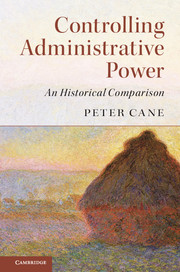Book contents
- Frontmatter
- Dedication
- Contents
- Preface
- Table of cases
- Table of legislation
- 1 Introduction: concepts and methodology
- 2 The English system of government
- 3 The US system of government
- 4 The Australian system of government
- 5 The development and institutional structure of control regimes
- 6 Administrative interpretation
- 7 Administrative fact-finding and policy-making
- 8 Administrative rule-making
- 9 Administrative adjudication
- 10 Private law controls
- 11 Controlling information
- 12 The New PublicManagement
- 13 Controlling the controllers
- 14 Concluding reflections on methodology and themes
- Bibliography
- Index
7 - Administrative fact-finding and policy-making
Published online by Cambridge University Press: 05 March 2016
- Frontmatter
- Dedication
- Contents
- Preface
- Table of cases
- Table of legislation
- 1 Introduction: concepts and methodology
- 2 The English system of government
- 3 The US system of government
- 4 The Australian system of government
- 5 The development and institutional structure of control regimes
- 6 Administrative interpretation
- 7 Administrative fact-finding and policy-making
- 8 Administrative rule-making
- 9 Administrative adjudication
- 10 Private law controls
- 11 Controlling information
- 12 The New PublicManagement
- 13 Controlling the controllers
- 14 Concluding reflections on methodology and themes
- Bibliography
- Index
Summary
Introduction
In the previous chapter it was noted that whereas US courts apply more deferential standards of review to administrative interpretations than English or Australian courts, they apply less deferential standards of review to administrative fact-finding and policy-making than their Anglo-Australian counterparts. In that chapter an explanation for this contrast was offered in relation to administrative interpretations. The aim of this chapter is to elaborate and explain this difference of approach in relation to administrative fact-finding and policy-making.
This framing of the phenomenon to be explored and explained makes two implicit assumptions: first, that it is possible to distinguish reasonably clearly between the categories of ‘law’, ‘fact’ and ‘policy’; and secondly, that it is possible to define reasonably clearly the various standards of review that respectively apply to each of these categories so that each can be said to be more or less ‘deferential’ than the other(s). In fact, neither assumption is justified.
Law, fact and policy
Concerning the former assumption, consider first the distinction between law and fact. In practical terms, this distinction is reasonably straightforward: a question of fact is a question about the existence of some phenomenon in the world; a legal question is a question about the substance of rules and norms found in primary and secondary legislation, and in decisions of courts and (in England, anyway) tribunals. But this practical approach is not of much help when the issue is how to categorise the process of applying law to facts, which is central to much administrative decision-making. Is a decision about whether and how a rule applies to particular facts, a decision on an issue of law or a decision on an issue of fact? English courts have acknowledged the difficulty of answering this question by inventing a category of ‘mixed issues of law and fact’ and reviewing them under a standard of review akin to that applicable to issues of policy. Whether the porous nature of the law/fact distinction is similarly acknowledged by US courts is not clear (to me, anyway). Peter Strauss thinks that there remains a tendency to describe both questions of historical or scientific fact, and questions about the legal relevance of particular facts, as ‘questions of fact’, and that this confuses US law.
- Type
- Chapter
- Information
- Controlling Administrative PowerAn Historical Comparison, pp. 238 - 268Publisher: Cambridge University PressPrint publication year: 2016



